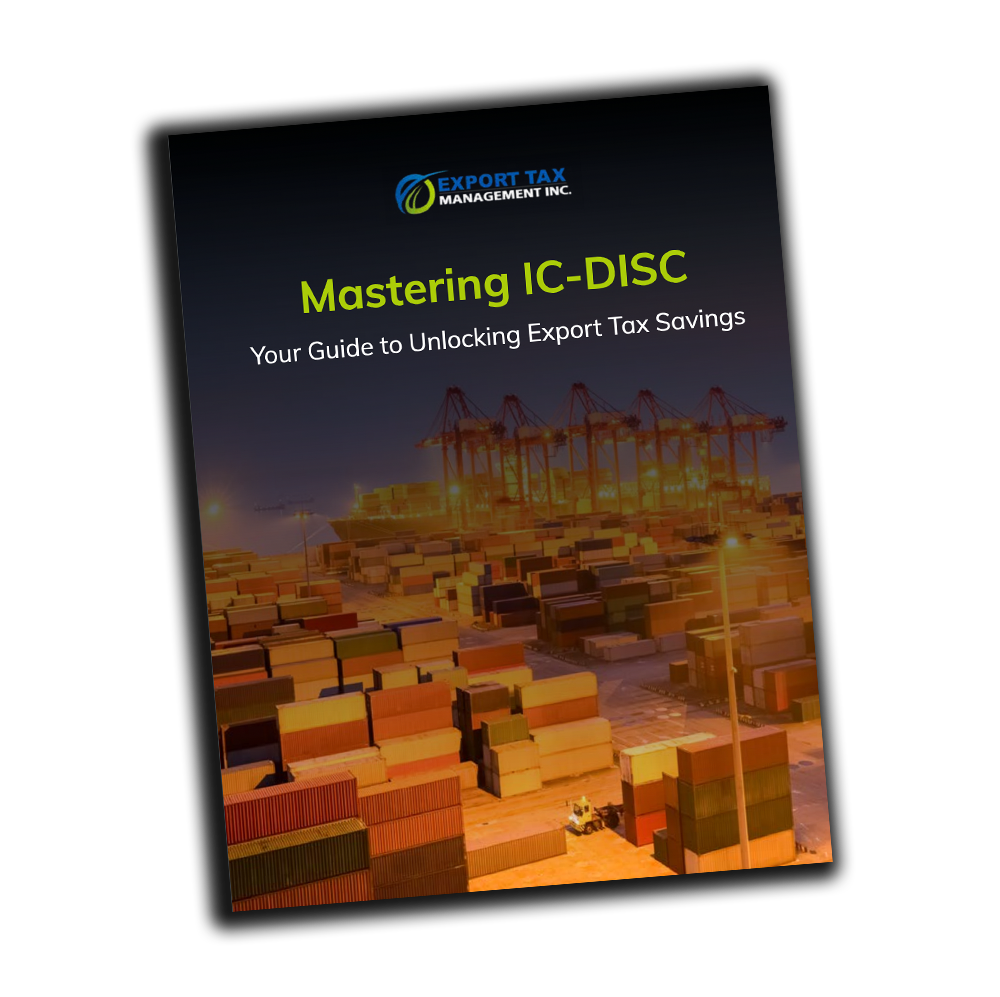IC-DISC for U.S. Exporters – A Proven Strategy for Export Tax Savings
If your company exports goods or services and you’re not taking advantage of the IC-DISC for U.S. Exporters, you’re likely missing out on substantial and legal federal tax savings.
What is IC-DISC for U.S. Exporters? Why it matters:
An Interest Charge Domestic International Sales Corporation (IC-DISC) is the only remaining federal export tax incentive in the Internal Revenue Code. It allows qualifying U.S. exporters to reduce their federal income tax liability by shifting a portion of their income into a separate, tax-favored entity. Despite its powerful advantages, many businesses either don’t know it exists or don’t use it effectively.
With global competition intensifying, every dollar counts. Leveraging the IC-DISC for exporters can be a game-changer in reducing your tax burden and improving cash flow.
What the article covers:
This guide covers how the IC-DISC structure works, who qualifies, how to set it up, and how to stay compliant. We’ll also show you real-world tax savings examples and strategic tips to maximize the benefit.
Table of Contents
- What Is an IC-DISC and How Does It Work?
- How Does an IC-DISC Help Exporters?
- Who Can Benefit from an IC-DISC Structure?
- IC-DISC for Exporters: Structuring It Right
- Common IC-DISC Tax Strategies
- Compliance and Reporting Requirements
- How to Set Up an IC-DISC (Step-by-Step)
- FAQs
- Conclusion
What Is an IC-DISC and How Does It Work?
Definition of IC-DISC
The IC-DISC for U.S. Exporters is a tax-exempt corporation that earns a commission on a company’s export sales. The operating company deducts this commission, which is later distributed to IC-DISC shareholders as qualified dividends, taxed at a significantly lower rate.
To understand the fundamentals, see this overview of what an IC-DISC is.
Legislative history (1971 to today)
Established under Internal Revenue Code §§ 991–997, the IC-DISC was created to encourage U.S. exports by providing tax relief. Over the years, Congress has repealed other export tax incentives, but the IC-DISC remains the only statutory incentive still in place.
How the structure functions
The structure involves two entities:
- The operating company, which sells goods or services overseas
- The IC-DISC, which receives commissions based on those sales
These commissions are deductible expenses for the operating company. The IC-DISC, as a tax-exempt entity, pays no federal tax on the commission income. When it distributes earnings to shareholders, they are taxed as qualified dividends.
For more details, review the applicable IC-DISC rules and regulations.
Tax benefits
- Ordinary deduction on commissions paid by the operating company
- Qualified dividend treatment for IC-DISC distributions
- Tax deferral available through the interest charge mechanism
- No federal tax at the IC-DISC level
Learn more about how to file the IC-DISC tax return to maintain compliance.
How Does an IC-DISC Help Exporters?

The IC-DISC for U.S. Exporters provides direct, ongoing tax advantages.
Direct tax savings
The operating company deducts the IC-DISC commission from its taxable income, reducing the overall tax liability.
Dividend tax treatment
IC-DISC shareholders receive qualified dividends, often taxed at 15–20%, a significant reduction compared to ordinary income tax rates.
Tax deferral advantage
Companies that retain IC-DISC income can defer taxation, paying only a small interest charge to the IRS, freeing up capital for reinvestment.
Example: $10 million in export sales
- $2 million commission paid to IC-DISC
- $700,000 federal tax savings (based on a 35% deduction)
- $400,000 dividend tax paid
- Net savings: $300,000+ annually
For more on optimizing commission timing and structure, see how to maximize your IC-DISC.
Review key IC-DISC commission payment rules to ensure proper setup and timing.
Who Can Benefit from an IC-DISC Structure?

The IC-DISC for exporters applies to a wide range of industries and entity types.
Eligible entities
- C-Corporations
- S-Corporations
- Partnerships
- Sole proprietors (with restructuring)
Qualifying exports
- Tangible goods manufactured in the U.S. and sold abroad
- Engineering and architectural services for foreign projects
- Certain software used outside the United States
Core requirements
- Products must contain at least 50% U.S. content
- Export sales must be for direct use outside the U.S.
- Ownership must be U.S.-based
For a breakdown of eligible industries and products, review IC-DISC benefits by industry.
You can also explore how export promotion expenses relate to IC-DISC qualifications.
IC-DISC for Exporters: Structuring It Right

Setting up an IC-DISC for U.S. Exporters correctly is crucial for compliance and effectiveness.
How to form and elect IC-DISC status
- Create a new domestic C-Corporation
- File IRS Form 4876-A to elect IC-DISC status
- Capitalize the company with at least $2,500 in stock
- Draft a written commission agreement between the IC-DISC and operating company
More details can be found in the instructions for Form 1120-IC-DISC.
Commission calculation methods
- 4% of qualified export gross receipts
- 50% of combined taxable income (CTI)
- Use of the greater of the two or transaction-by-transaction analysis
For an in-depth guide, see how IC-DISC commissions are calculated.
Banking and documentation
- Open a separate bank account for the IC-DISC
- Maintain separate books and records
- Preserve documentation to support commission calculations
Common IC-DISC Tax Strategies

Effective IC-DISC tax strategy hinges on optimizing commission methods and export structure.
Maximize commissions
Use the transaction-by-transaction method to apply the most favorable commission calculation to each qualifying sale.
Reallocate expenses
Reassign costs to increase CTI from exports, thus increasing the eligible commission base.
Consider entity restructuring
Segment export sales into a separate business unit to isolate and increase IC-DISC commission potential.
Align with transfer pricing
Ensure related-party transactions are priced in accordance with IRS standards to avoid scrutiny.
For advanced strategies, review the full IC-DISC tax strategy guide.
Compliance and Reporting Requirements

Maintaining an IC-DISC for U.S. Exporters involves proper IRS filings and recordkeeping.
Annual tax filing: Form 1120-IC-DISC
The IC-DISC must file an annual return reporting income, deductions, and shareholder information. See full details on preparing and filing Form 1120-IC-DISC.
Schedule P: Commission breakdown
This schedule provides transparency on how commissions were calculated. It’s essential for audit defense and IRS compliance.
Required documentation
- Export invoices and records
- Cost allocation worksheets
- Supporting financial statements
Risks of noncompliance
- Loss of IC-DISC status
- Penalties for late or incorrect filings
- Increased IRS scrutiny
To stay current, understand the commission payment due dates and filing schedules.
How to Set Up an IC-DISC (Step-by-Step)
- Confirm eligibility
- Form a domestic C-Corporation
- File IRS Form 4876-A to elect IC-DISC status
- Determine ownership and shareholders
- Establish commission agreement
- Open separate bank account and maintain books
- File Form 1120-IC-DISC annually
For legal clarity, refer to this discussion on private letter rulings and IC-DISC compliance.
FAQs
Yes, IC-DISC is authorized under the Internal Revenue Code and has withstood legal and regulatory changes for over 50 years.
Yes, but the IC-DISC must remain a C-Corp and cannot be merged into the S-Corp structure.
You must wait until the next tax year. Late elections are not permitted.
Yes, engineering, architecture, and software services performed in the U.S. for foreign use may qualify.
Yes, if there is net profit on export transactions. However, losses on export sales may limit or eliminate the benefit.
See more answers in the IC-DISC FAQs section.
20+ Years IC-DISC Experience
Unlock Significant Tax Benefits with IC-DISC
Our objectives are simple: to provide you with maximum export tax savings, while delivering unmatched personal attention by our staff of CPAs. Schedule a free consultation today to discuss how Export Tax Management can help you.
Schedule Free ConsultationConclusion
The IC-DISC for the U.S. Exporters is a powerful, IRS-recognized export incentive. Properly implemented, it can deliver permanent federal tax savings year after year for qualifying businesses.
If your company is engaged in exporting and you’re not leveraging this incentive, you’re likely missing a strategic opportunity to boost after-tax income. To explore how the IC-DISC for U.S. Exporters can enhance your tax strategy, contact Export Tax Management. With over 25 years of experience, Paul Ferreira is one of the only CPAs in the U.S. specializing exclusively in IC-DISC formation and compliance.




